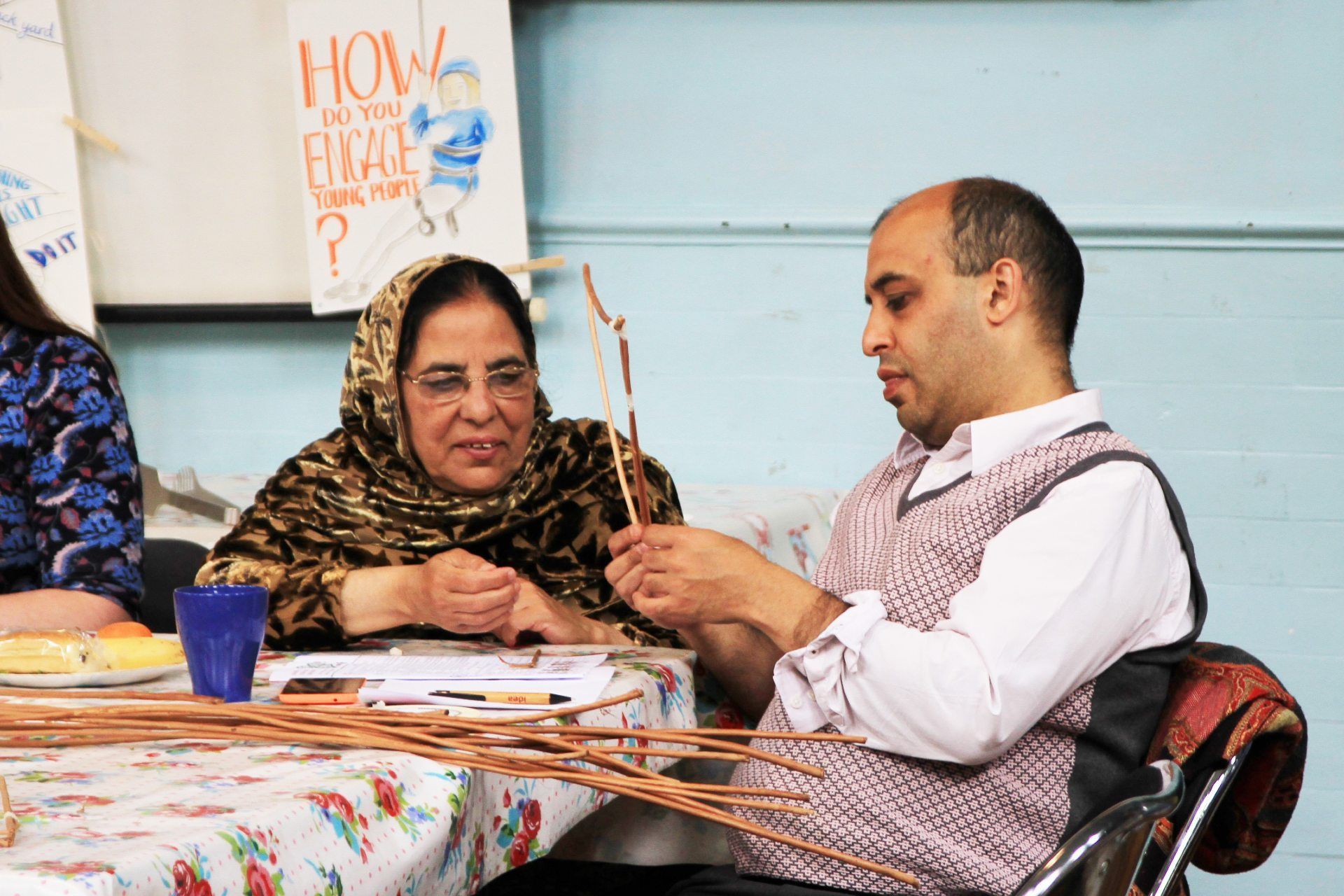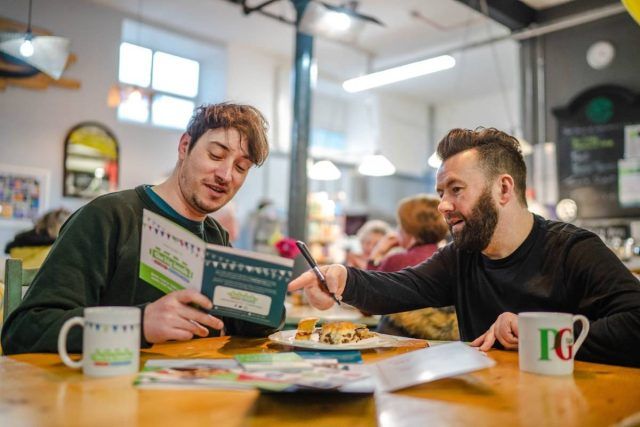
How to talk to anyone
Friends, neighbours, colleagues, you, us, them – communication is the art of connecting with people. It’s a powerful tool that can help engage people, change behaviour and connect people in your community.
Although some people make it look easy, in reality the majority of us find meeting and talking to new people daunting. There are some simple things you can do to help ease the conversation along, though – and the more you do it, the easier it gets.
If you’re looking for a way to connect with people (in a community group or just more generally in life), try applying a few of these ideas to what you’re doing.
Meeting new people isn’t easy
It’s not easy to forge new relationships and communicate with others, especially when you’re not sure what you have in common. Try to remember that lots of people feel this way and don’t make assumptions about anyone before you’ve had a chat.
Finding some common ground can be really useful – noticing a band on a t-shirt, a particular piece of jewellery or simply being enthusiastic about choosing the same type of cake. Talking about something specific can help pave the way for wider introductions.
If you’re organising an event or leading a group, be aware that simply turning up is a huge step for some.
Conversation starters
One of the best ways to start a conversation is to ask questions. They don’t always need to be the most frequently-asked questions such as jobs or family – once you’ve got the initial introductions out the way, why not ask some of our suggested questions?
Listen carefully to what the other person is saying and if anything piques your interest, ask further! It’s amazing how even the quietest people can become chatty when talking about something they love. Asking good questions is a skill you can develop like anything else in life, so practice with your friends and family first if you’re nervous.
Top tip: We have some brilliant conversation starters in our Big Lunch pack.
- What do you love to do / what brings you joy?
- Tell me about [something descriptive]
- What’s your favourite X?
- What made you choose to come here today?
- What’s been the best part of your day so far?
- What does your dream weekend look like?
- What is the best piece of advice you’ve ever been given?
- What was your favourite childhood story or TV show?
- What was your first gig ever?
- Do you have an outfit you look back on and can’t believe you wore?
- What book or film should everyone read/watch?
- If you could only eat one cuisine for the rest of your life, what would it be?
Tell your own story
One of the best ways to connect with someone is by being open and honest with them. Sharing your own story and experiences (if you’re comfortable to) can open the door for a deeper and more meaningful relationship.
Being clear about your actions can be really helpful if you’re part of a community project too. People are much more likely to be supportive if they can understand why something is happening. For example, a sign explaining that wildflower seeds have been planted and need to be undisturbed may be better received than one saying ‘Keep off this area’.
You’ll never please everyone, but by being honest, authentic and open about who you are and what you’re trying to achieve, you’re more likely to find those who support you and want to get to know you.
Ice breaker games
Ice breaker questions can be brilliant, but just consider how they might affect everybody in the group before going ahead. ‘Tell me something interesting about yourself’ can be hard for people who feel they don’t have much interesting going on in their lives, or don’t want to share. Giving people a bit of warning so they can think in advance can make the activity more enjoyable for everyone.
A good break the ice game is to have people raise a hand or move to a certain area of the room if the question applies to them. Questions could be:
- I am an only child
- I’ve lived abroad
- I’m left-handed
- I like gardening / cooking / running / other hobby
- I speak another language
This sort of activity helps people to realise just how much in common we all have and can spark later conversations. You can even add in some more nonsense questions such as ‘Would you rather fight 1 horse-sized duck or 100 duck-sized horses’ to get people laughing and interacting.
Tips for connecting online
Many conversations and interactions now take place online, whether over messaging apps, social media or video calls like Zoom. This change is a huge benefit in many ways – they widen access to the world and give new opportunities for connection that weren’t available previously.
However, these platforms change the style and flow of conversations, as well as affect our ability to read people’s body language. Here are our top tips for connecting online.
- If you’re in a video call, have your camera on as much as possible and consider smiling or nodding along with whoever is speaking. It can be really challenging to speak to a screen of blank or distracted faces – it would be rude to turn away or do something else in real life, so try not to do it online.
- Likewise, react to people as much as possible (there are little emojis you can click on in Zoom and Teams) or comment in the chat. Supportive words make a huge difference to the person who’s speaking!
Alternatives to sit-down conversations
Sometimes, sitting down face-to-face for a conversation can be the hardest way to connect with someone. It can be easier to chat to people when you’re doing a shared task together (such as preparing food or a craft). If you’re leading a group of people meeting for the first time, setting out activities or assigning jobs can help to get people chatting. You may be amazed to discover how much you find out just through completing a shared task together!
Walking alongside each other can also be a nice way to connect without the intensity of a face-to-face conversation. Rather than meeting someone in a coffee shop, why not get coffee to take away and suggest a walk instead (if you’re both able)?
Group activities such as board games, running, crafting or a book group can also be great ways to chat to new people, where something else is the focus of attention.

Keep the connection going
Once you’ve met a new friend, joined a group or started leading a project, it can be hard to know how to keep the connection going. Follow up after your first meeting and suggest putting something in the diary, but don’t be too disheartened if other people’s schedules are different or busier than yours. Not everyone has the same amount of time to give – think quality over quantity. Likewise, communicate your availability clearly and how often you’d like to see someone or participate in a project.
If you’re wondering about whether to reach out to someone, or you’re thinking you’ve not heard from them in a while, why not drop them a message? It can make a huge difference to someone who’s struggling. At the other end of the spectrum – if someone isn’t responding, try not to take it personally. They may have their own reasons for being quiet, and it’s almost certainly not you. Focus on your other friendships and connections.
Easy ways to spark interactions
– Smile at people (it makes you feel good too!)
– Offer to help – hold the door, lift the buggy, make a tea
– Compliment someone (it can really make someone’s day)
– Ask questions and be curious about the other person


